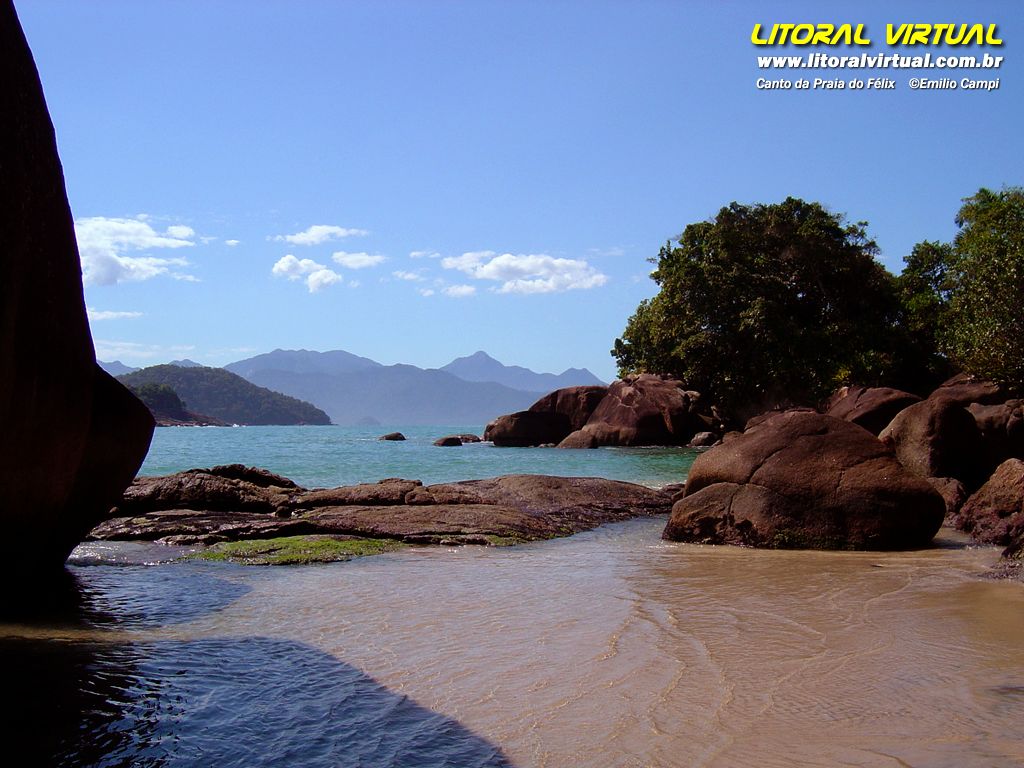I've been reading some articles on the web and some other topics around here on these 2 systems. Brazil introduced PAL-M around 1970 and this system seems to run also at 29,97 fps, pretty much like NTSC, but differently from this one, it uses the PAL color palette for that (perfection at last). I've read some people writting that PAL-M runs at 30 fps. Is that right or wrong? And the last question...how would I render a project (some still pictures with some motion made with the help of keyframes) in Vegas with the MainConcept encoder to PAL-M at the same 29,97 fps?????
Thanks in advance
Note: Brazil is NTSC for DVD. All TVs have both systems nowadays and/or conversors.
+ Reply to Thread
Results 1 to 30 of 33
-
-
PAL-M was a hybrid format done in Brazil only. It used 60 Hz 525/60 raster and used the same calculations to place subcarrier at 3.58MHz with the same actual framerate at 29.97 fps as NTSC color. Brazil went to color about 10 years after everyone else so it had options for encoding.
By the 70's most of the NTSC ("Never Twice Same Color") problems had been mitigated with more stable circuits. PAL (Phase Alternate Line) eliminated the hue control by alternating chroma phase every other line to create a stable hue average even if the transmission path had phase errors.
Bottom line, PAL gave the hue control to "big brother" and removed it from the TV.
and removed it from the TV.
Some would say Brazil chose PAL to get the best of both worlds. Others are more cynical. They would say Brazil chose 525 line PAL so that their TV sets were unique in the world and could only be produced in Brazil effectively shutting out imports (smuggled due to high import tariffs) from Japan or USA. The result was color TV sets that cost 2-3x more in Brazil since they were protected from external competition.
That is all history. Today Brazil is in a similar position with France in having a proprietary analog TV standard while the rest of the world is advancing to digital and have lost interest in supporting legacy PAL-M or SECAM.
The salvation for both SECAM and PAL-M for the last 20 years has been analog componets and the Betacam recording standard. Acquisition to analog Y, (R-Y), (B-Y) aka YUV allows analog or digital computer based production/editing that is separate from the PAL, PAL-M, Secam or NTSC transmission systems.
So to your direct question, you would originate your project using NTSC type equipment but only using component YUV. That means "Ntsc" DV camcorders and firewire transfer to YUV (DV format or uncompressed) and author a "ntsc" scanrate MPeg2 DVD which is also YUV.
Only on playback will the PAL-M DVD player encode to PAL-M. You would only use this PAL-M output only for older TV sets. For modern sets you would use analog componets, DVI or HDMI that have no association with PAL-M.
The problem remains for over the air analog PAL-M TV capture. For this you need a PAL-M capable tuner-capture card or a PAL-M aware DVD recorder. After capture you are in YUV component space and free from PAL-M.
PS: Don't get me wrong, I am a fan of Brazil and the companies I used to work for made a fortune building custom PAL-M broadcasting equipment. Since Brazil never had the volume with PAL-M to internally produce transmission equipment. European and US broadcast equipment manufactures made good money selling custom PAL-M models to Brazilian broadcasters. This gave many of us the opportunity to visit and enjoy your country. Give my regards to my friends at TV Globo.Recommends: Kiva.org - Loans that change lives.
http://www.kiva.org/about -
In case I didn't make it clear. There is no difference between a "NTSC" or PAL-M" DVD. There is no NTSC or PAL on the DVD, only YUV components. Composite NTSC or PAL-M are encoded inside the DVD Player at the output stage.Originally Posted by Cunhambebe
It is also true that there is no PAL on a PAL DVD. There are only 25fps YUV components at 720x576 frame size. .Recommends: Kiva.org - Loans that change lives.
http://www.kiva.org/about -
Thanks so much, edDV for this wonderful explanation. Anyone who lives in Brazil and reads what you've just written it down will conclude you are the one. So you know the people at Globo (Globe) Network and you've been to Brazil...nice to know that.
I agree with everything you said but there's one more thing:
As far as we know here, Brazil didn't really choose the PAL system (later modified to PAL-M by the Brazilian enginners). When the country chose to buy the nuclear technology from Germany, we heard that the PAL system was part of the bundle. I guess you know better than myself that PAL-M seems to be in fact a hybrid system using the PAL color, that anyway, I guess, has colors much better than the NTSC.
BTW, when you refer to the new technology, the government has released a considerable amount of money for research since the country wanted to develop it own HDTV system based on the American/Japanese or European system but with an emphasis "on the internet". Since there's a kind of deadline for all countries to choose amongst the systems, Brazilian Technicians from most universities involved in the project will definitely not have enough time to present what they wanted to. So, this time it seems Brazil will have to choose amongst what has already been developed. I understood your explantions and would like to thank you once again to take time to do it. Come to Brazil and I'll take you to Ubatuba, a region between the States of Rio and São Paulo and we'll swim and dive along with the dolphins (and please bring your NTSC or HDTV camera or whatever...lol). Thanks a lot,
Mark
PS: So I'll get back to NTSC anyway
-
I didn't know about the Greman nuclear power deal. I was told about the desire to manufacture unique televisions in Brazil. TV systems back then were part of high level state politics. France required several Middle East countries to accept the SECAM system as part of a military jet fighter deal. The French also got the Soviet Union to take the SECAM system as part of a political deal.Originally Posted by Cunhambebe
PAL-M is a hybrid system with frames size and sync rates = to the US-Japan NTSC syetem but with color encoding using the PAL method. The only real difference in this implementation is the lack of a hue control on the TV. The hue is set by the broadcaster and the PAL system is stable enough to deliver that to the TV unchanged. The amount of color detail is the same as the NTSC system.Recommends: Kiva.org - Loans that change lives.
http://www.kiva.org/about -
The good thing is most world HDTV systems are converging to the same 16:9 aspect ratio, square pixels and 1920x1080 frame size. Some are also using 1280x720 progressive. Frame rates still differ in order to maintain compatibility with previous 29.94 fps (NTSC + PAL-M) and 25 fps (PAL-B + SECAM) scan rates.Originally Posted by Cunhambebe
Thank you. I'm searching for a couple of pictures from my most recent trip to Brazil in 2002.Originally Posted by Cunhambebe
Here they are. We had a great time Paraty, Rio, São Paulo.
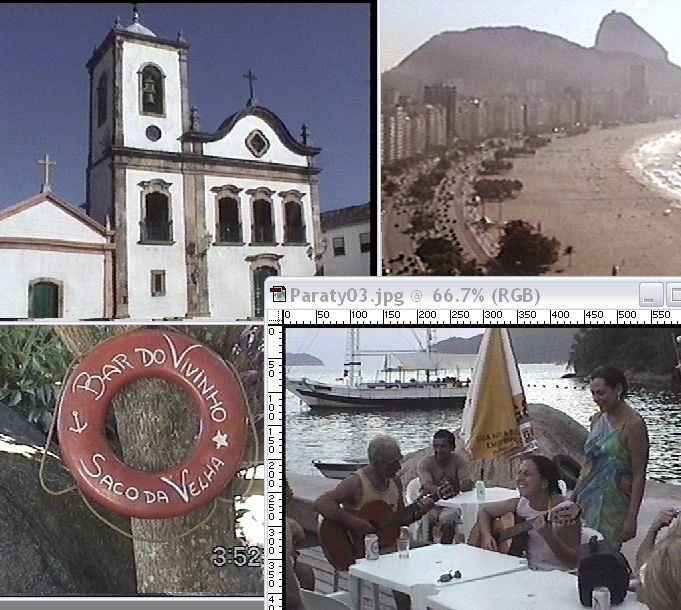 Recommends: Kiva.org - Loans that change lives.
Recommends: Kiva.org - Loans that change lives.
http://www.kiva.org/about -
Thanks again for taking time to write, edDV....
-That's also absolutely true.I was told about the desire to manufacture unique televisions in Brazil.
-That can be true, but PAL-M colors look a loooot..... betterThe amount of color detail is the same as the NTSC system.
-Thanks for the input on HDTV.
edDV, I'd like to thank you again...I'll upload some pics taken in Ubatuba...
I wish you all the best,
Mark
-So you've been there...Paraty is next to Ubatuba. I love Paraty, the old town and you've been also to Saco da Velha on a schooner...lol lol that's a nice place to go out on vacantion...and it's a small world after all, isn't it edDV?

-
-
Thank you, I posted a few 8mm frame caps above. We took a sailboat out from Paraty and toured the islands. It was a wonderful trip.
There is a problem sending you a private message.Recommends: Kiva.org - Loans that change lives.
http://www.kiva.org/about -
For some reason, my return message won't send.Originally Posted by CunhambebeRecommends: Kiva.org - Loans that change lives.
http://www.kiva.org/about -
Yes, they are there; 3 of them

So you've been to Campinas also (besides Rio, São Paulo, Paraty...), then maybe you're more Brazilian than me Thanks again edDV. I'll send it for you, friend.
Thanks again edDV. I'll send it for you, friend.
Cheers,
Mark -
Just to let you all know; an user came up with this idea...
-No, I haven't...who knows...I would use the PAL-DVD template, then change the frame rate to 29.97 OR 30 fps, but your question begs the assumption this is impossible. Have you already tried it?
-
My observation remains that there is no "PAL" on a PAL DVD and there is no "NTSC" on a NTSC DVD. For video there are only differences in scan lines and frame rate. MPeg2 carries YUV components as 4:2:0 on both.Originally Posted by Cunhambebe
It would be better to call the specs "625/50" and "525/59.94". PAL-M has the same number of scan lines and frame rate as NTSC. Film telecine issues are identical for PAL-M because it is a framerate issue.
Only the DVD player encodes PAL, PAL-M or NTSC (Composite and S-Video out). So there are differences in DVD players but not the DVD disc itself.
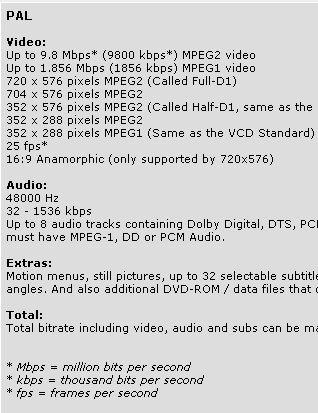
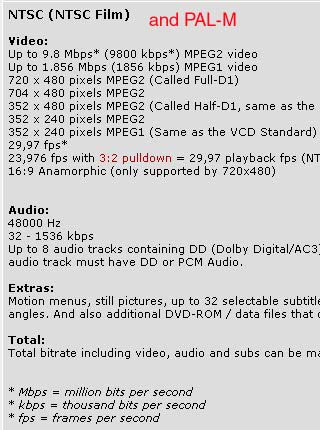
For audio, there are some differences between "PAL" and "NTSC" DVD specs but they have nothing to do with PAL or NTSC.
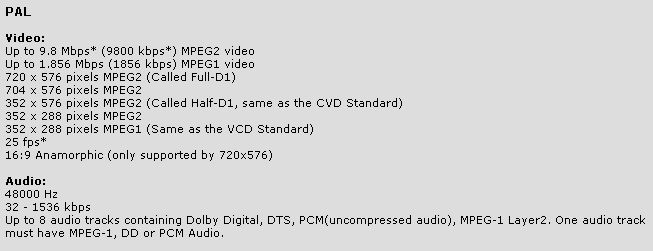
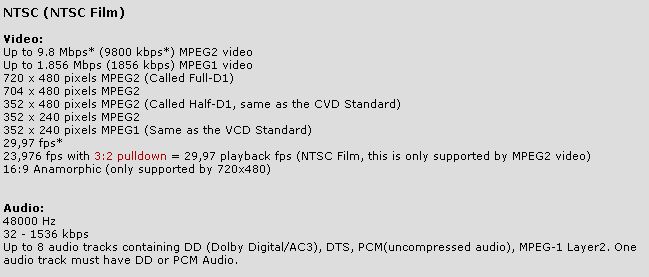 Recommends: Kiva.org - Loans that change lives.
Recommends: Kiva.org - Loans that change lives.
http://www.kiva.org/about -
Hi edDV, thanks again for taking time to respond....
- Sure you're absolutely right, but since I am a lawyer (lol) and not a video professional like you are...do you belive encoding PAL at 29,97 will work?For video there are only differences in scan lines and frame rate.
-I've read around here that DVD players can play anything...from NTSC to PAL and PAL-M....So there are differences in DVD players but not the DVD disc itself.
Sorry for my ignorance. :P
Cheers,
Mark -
I'm not an expert in DVD authoring for PAL-M playback, I am only making observations based on the DVD spec.
I can assume the following processes for DVD authoring for the Brazil market. I hope there is a PAL-M expert that can confirm or dispute these conclusions.
1. Authoring a DVD from MiniDV camcorder.
http://www.sonystyle.com.br/br/site/catalog/ProductDisplay.jsp?parentCatId=cat870027&c...=1&id=DCR-HC21
The DV camcorder appears equal to 525/29.97 NTSC model. It produces 720x480 DV format at 29.97 frame rates. This would be authored to DVD using "NTSC" spec MPeg2 (720x480 29.97 interlace).
The resulting DVD will be identical to a "NTSC" DVD that is 720x480 interlaced 29.97 fps and 4:2:0 YUV Mpeg2 encoding.
When played in a DVD player,
http://www.sonystyle.com.br/br/site/catalog/ProductDisplay.jsp?stockType=A&parentCatId...1&id=DVP-NS50P
The output will be
Y, Pb, Pr - component analog
composite or S-Video (NTSC or PAL-M?)
My limited Portuguese runs out at this point. The Sony specs are not clear as to the way PAL-M output is provided.
Then to TV in analog component, PAL-M or NTSC.
SDTV
http://www.sonystyle.com.br/br/site/catalog/ProductDisplay.jsp?stockType=A&parentCatId...&id=KV-29FS110
HDTV
http://www.sonystyle.com.br/br/site/catalog/ProductDisplay.jsp?stockType=A&parentCatId...id=KLV-S32A10T
2. TV Tuner capture
This would require a PAL-M compatible TV tuner card. The digitized output from the card would be YUV 720x480 29.97 fps and from there on the process would be identical to NTSC.
The main problem is finding a computer capture card that supports PAL-M tuning.
ATI states
 Recommends: Kiva.org - Loans that change lives.
Recommends: Kiva.org - Loans that change lives.
http://www.kiva.org/about -
I think you should advise your HDTV academics to choose an existing world standard or consumers will continue to be ignored by major suppliers of equipment like this.
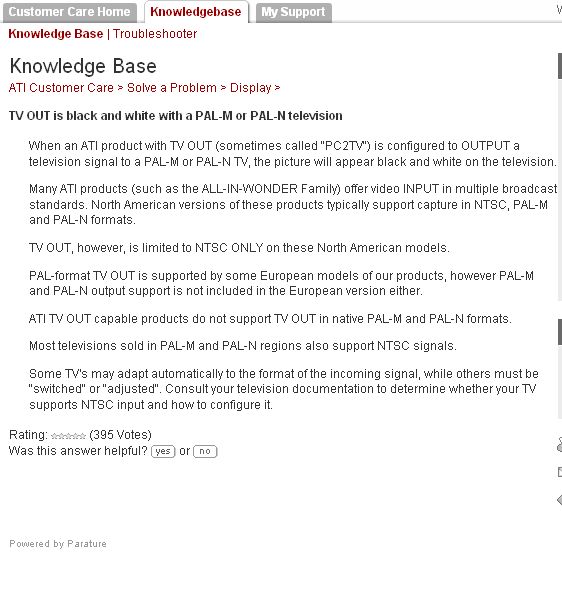 Recommends: Kiva.org - Loans that change lives.
Recommends: Kiva.org - Loans that change lives.
http://www.kiva.org/about -
Hi edDV, thanks again for your explanations. Muito obrigado (Thank you)...
Hope you didn't get me wrong when I said you were a video professional while I was not (since you said you had visited Globo network here in Brazil).
Thanks for the links in Brazilian Softened Portuguese and for the articles too.
Brazil will have to choose its HDTV system until next April, I guess. I think there's a kind of deadline and the so called academics will have to choose among what's been introduced in terms of HDTV in the world, that is, the North American HDTV, the Japanese and the European system.I think you should advise your HDTV academics to choose an existing world standard or consumers will continue to be ignored by major suppliers of equipment like this.
As I told you before, this was just a test, since all TVs in Brazil have both systems nowadays (PAL-M and NTSC) or internal transcorders to go from NTSC to PAL-M (my TV is a PHILIPS with the dual system - note: public television as well as cable TV remain PAL-M; NTSC is only intended for DVD players). This way, all DVDs here are burned to NTSC - and that includes of course all titles imported from North America, duplicated here and released through local distributors such as Fox Film do Brasil (20th Century Fox); Cinema Internacional Corporation (Universal/Paramount), Columbia-Tristar do Brasil, Warner, etc...
In fact, the goal of this topic was to learn a bit more (and I am sure I have achieved that thanks to you) and to help a person around here who wanted to capture an old PAL-M VHS video with Adobe's Premiere or Vegas. I guess he's stubborn and he's going to render the final output to PAL MEPG2 at 29,97. Let's see if it's going to work....lol lol
Once again, I would like to thank you very much - and I hope I can count on you for further discussions around here.
I wish you all the best,
Mark -
Well my limited investigation shows there is no difference between a NTSC and PAL-M DVD since there is no NTSC or PAL-M on the DVD itself.
If this "common" DVD is to be played to a PAL-M only TV, the DVD player must support PAL-M output.
If I was giving advice to the Brazil "HDTV academics" I would say keep the "core technology" compatible with the USA or Japan and only add optional features. That way "generic" equipment will work in Brazil without special modifications that drive up cost to the consumer.
Your friend needs a capture card or device that supports PAL-M input. According to that ATI link, "most" North American ATI All-In-Wonder cards support PAL-M capture to YUV. Once you get to YUV, everything else is the same.Recommends: Kiva.org - Loans that change lives.
http://www.kiva.org/about -
Thank you very much. Now some people are asking me about encoding to MPEG2 NTSC with upper or lower field first...I'm going to post another topic for this.
Thanks again for your help
Cheers! -
i just took a look in TMPGEnc 3.0 Xpress and in the set output tab I can choose PAL DVD, then I can goto the left side to the MPEG Output button and chnage the aspect ratio and frame rate. thus I can choose PAL size, NTSC frame rate.Originally Posted by Cunhambebe
Also in TMPGEnc Plus I can choose the PAL template, then go to advanced choose unlock.mcf which lets me adjust the settings. Then just adjust the frame rate to 29.97.
My suspicion is that the biggest problem might be authoring it?
I'm pretty sure I could author in TMPGEnc DVD Author program by using DVD Patcher to change the header to standard PAL, add to the author program, save, then unpatch the mpeg file, reopen the saved project in DVD Author, and author it. Using this process I have successfully authored DVB MPGs (544 by 480) to DVD. It did complain about the GOP size but took them with the headers patched to DVD spec.
Hope this helps.
BTW Globo TV only ha sthe one channel (international version here in the USA). Their shows never seem to show at the time shown on the website or the guide. Is this a common problem in Brazil or maybe something Dishnetwork is doing to the signal? -
- I guess Sony DVD Architect might be able to handle it. Thanks a lot for your help.My suspicion is that the biggest problem might be authoring it?
-I don't know about Globo International Channel, but their shows in Brazil are always on time. Of course there are institutions here such as the 8:00 pm soap opera that is actually shown at 9:00 pm, but everyone knows it is just called "the 8:00 o'clock soap opera" and that is actually shown at 9:00 pm. Now they are airing a story on a factory that produces women's underware called "Belíssima" (Pretty Beautiful). Globo is themost important network in Brazil with studios in São Paulo and Rio. they have built a huge entreprise in Rio called Projac. Other networks are Cultura (Culture São Paulo); SBT (Brazilian Television System); Record (belongs to a protestant church in Brazil); Rede TV! (TV Network) and Bandeirantes TV (nowadays called BAND TV).BTW Globo TV only ha sthe one channel (international version here in the USA). Their shows never seem to show at the time shown on the website or the guide. Is this a common problem in Brazil or maybe something Dishnetwork is doing to the signal?
Globo Network owns also a cable channel named NET that presents all public channels from the networks described above and also channels such as Sony, Warner, Cartoon Network, CNN, Disney Channel, HBO, La Cinq (France), RAI (Italy), etc... and 5 Telecine Channels - more than or almost 100 channels. Other cable Tvs here that I know are Sky and TV A.
Cheers!
PS: Sorry, HBO here belongs to TV A. -
So, you must have redered the files to NTSC. Hey what are you holding? Is that a fresh water fish called Tucunaré?

-
Ah tá.... (means Oh yes or OK). It's a wonderful fish. So you've been fishing in Brazil...good! Next time we're going to plan to fish some Pirarucus around here

Cheers!
Mark -
Remember that there is no difference on the DVD disc between NTSC and PAL-M. The DVD is identical.
The differences only apply to PAL-M capture to YUV and DVD player output to PAL-M.
Nothing else matters.Recommends: Kiva.org - Loans that change lives.
http://www.kiva.org/about -
Thanks so much for your attention and your help, edDV. You know, things happen and life is very curious. Let's see: I was watching Globo news tonight and guess what...they aired a story on the Brazilian HDTV.
-It seems this information was partially accurate and I do apologize for that since it seems there was enough time for Brazil to develop its own system.when you refer to the new technology, the government has released a considerable amount of money for research since the country wanted to develop it own HDTV system based on the American/Japanese or European system but with an emphasis "on the internet". Since there's a kind of deadline for all countries to choose amongst the systems, Brazilian Technicians from most universities involved in the project will definitely not have enough time to present what they wanted to. So, this time it seems Brazil will have to choose amongst what has already been developed.
Globo News showed tonight that the Brazilian HDTV has already been developed by a panel od 1,500 researchers from about 79 Universities that were involved in the project. They said the newly developed Brazilian HDTV IS READY AND IT IS based on the North American, Japanese and European system with an emphasis for what Brazil needs such as:
-MOBILITY (will be captured by celular phones);
-INTERACTION (presenting a selection of menus and I guess with the World Wide Web), and also;
-COMPATIBILITY (with the 3 mentioned systems at the same time as well as with the ancient system which is PAL-M, through the use of an adaptor (decoder).
This new format will be a public television, that means free of any kind of charge. It's going to be an international system called International Brazilian HDTV System covering all the 8,511,965 square kilometers that make up the Brazilian Territory. There was some testing going on last April and the transmissions will start next year with the World Cup in Germany. The HDTV system will begin its commercial transmissions on 7th of September, the Brazilian Independence Day, 2006.
Philips and Sony must be very furious with this kind of decision because they were trying to introduce their own systems here. In fact, they have been selling Plasma and LCD widescreen TVs (Samsung and also Panasonic) for about 3 years around here and all of them are HDTV-Ready but for their own systems.
So now it is official: there's going to be another kind of HDTV in the world compatible with those already developed systems :P
Cheers!
Mark -
Thanks for the information. Might be a dishnetwork guide problem as for example: Youset a timer for football on sunday you will either get part of the show before or loose part of the game. same thing happens at the endof the timer.Originally Posted by Cunhambebe
A link to sundays schedule... http://tvglobointernacional.globo.com/programacao.jsp?iGrade=1069&iTmz=208&iChannel=6
The other thing is that shows in the USA usually start on the hour or half hour whereas GLobo's schedule....
On another note: One of my first captures of TV was via a USB device using Sonic MyDVD to capture of a music special from TV Globo International.
anyway I've rambled on enough,
Cheers
Similar Threads
-
Pls help! Best way to convert NTSC VHS (captured using PAL VCR) to NTSC DVD
By rairjordan in forum Capturing and VCRReplies: 33Last Post: 28th Nov 2013, 11:33 -
when Pal dvd has correct Ntsc audio (Pal>Ntsc conver)
By spiritgumm in forum Video ConversionReplies: 15Last Post: 13th Oct 2011, 12:57 -
PAL to NTSC, NTSC to PAL framerate conversion?
By Baldrick in forum Video ConversionReplies: 44Last Post: 5th Dec 2009, 23:31 -
Creating NTSC Blu ray DVD From PAL TS Files. need help with NTSC format
By Rick0725 in forum Authoring (Blu-ray)Replies: 0Last Post: 9th Apr 2009, 21:43 -
NTSC to PAL, PAL to NTSC framerate conversion?
By Baldrick in forum Video ConversionReplies: 23Last Post: 23rd Apr 2008, 11:19




 Quote
Quote